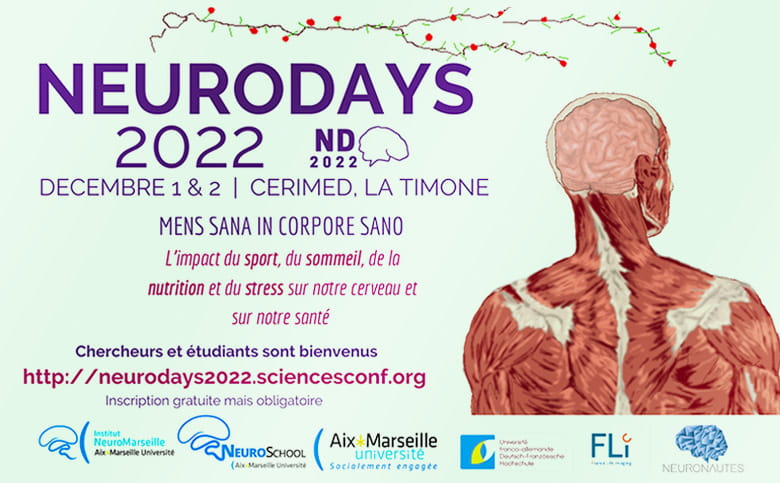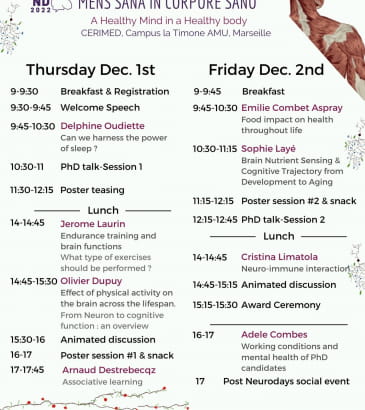
NeuroDays 2022 : «Mens sana in corpore sano»
Les Neurodays 2022 auront lieu les 1 et 2 décembre 2022 !
Neurodays 2022 will take place on December 1 and 2, 2022!
This year’s conference focuses on the importance of a healthy mind, a healthy body and the relationship between the two. In order to explore this topic we have decided to structure the conference around four main themes exploring the impact of physical activity, nutrition, sleep and stress on each of us.
Save the dates of December 1 and 2, 2022 to attend this event at CERIMED, on the Timone Campus, in Marseille. We promise you exciting lectures, interactive poster sessions, a round table with our speakers and a post-NeuroDays event to celebrate the end of the congress.
Come and join us! (Registration required)

NeuroDays program
The 2022 edition will be full of surprises! There will be a poster competition and mentoring roundtables with the speakers! All interspersed with presentations from renowned researchers.
Find all the information on the NeuroDays 2022 website!
Speakers

Delphine Oudiette is a researcher in cognitive neuroscience at the Institut du Cerveau. Her work aims to understand what happens when we sleep on the cerebral, cognitive and subjective (dreams) levels. How is sleep a particular state of consciousness compared to wakefulness? Does sleep transform the way we think and act when we are awake? His research focuses on the role of sleep and the dreams that accompany it in memory and creativity.

Jérôme Laurin is a doctor in human movement sciences and a lecturer at Aix-Marseille University in the Faculty of Sciences and Techniques of Physical Activities and Sports. After working at the Institute of Movement Sciences Etienne-Jules MAREY (ISM), he continues his research at the Institute of Neurobiology of the Mediterranean (INMED), within the team "Early activities in the developing brain". His work focuses on the influence of physical exercise on cerebral and muscular plasticity as well as on recovery after a vascular accident.

Initially trained in "Education and Motricity" in the STAPS field at the University of Limoges as well as at the IUFM of Limoges, Olivier continued his studies in the "Sports Training" field at the University of Limoges and Bordeaux. Afterwards, he followed the Master APAS - IRHPM at the University of Poitiers, and went on to do a joint thesis between the University of Montreal and Poitiers. After obtaining his PhD, he did a post-doctoral fellowship at the Perform Center of Concordia University (Canada), during which he conducted research projects at the Montreal Geriatric Institute and the Montreal Heart Institute.

"My research focuses on the basic mechanisms of associative learning. I am also interested in the role of consciousness and the nature of mental representations developed during learning. I address these issues in adults and young children. I also like Guzzi motorcycles, 25oz raw denim and the Black Keys." is an Associate Professor at the ULB in Brussels and a researcher at the CRCN in the Consciousness, Cognition & Computation group.

"My research is multidisciplinary and focuses on how food (including whole foods, specific nutrients, and how we eat) impacts health across the lifespan, from the periconceptional period to old age. I am particularly interested in the link between "farm, fork and society" and its implications for all stakeholders, whether community, industry or clinical settings. This is a fascinating topic, as its implications are at the heart of the challenges facing modern society today: aging and chronic disease." Emilie is a Senior Lecturer in Human Nutrition in the School of Medicine, Dentistry and Nursing at the University of Glasgow.

Sophie Layé is the head of the NutriNeuro Institute (INRA Univ Bordeaux, Bordeaux INP) which she created in 2011. The research conducted in the Institute aims to decipher the effect of nutrition on cognitive decline and mood disorders to define a protective nutrition for the brain. She also co-directs OptiNutriBrain, an associated international laboratory, with Pr F Calon (Laval University, Quebec). Since 2018, she leads Food4BrainHealth, an international research network (Inra, CNRS, Univ Bordeaux, Univ Bourgogne, Univ Saclay, Univ Toronto, McGill, Univ Laval). Sophie is known for her work on the contribution of unbalanced diet in mood and cognitive disorders and on how lipids (omega3, omega6, etc.) participate in neuroplasticity and neuroinflammation.

Cristina Limatola is a professor at the Department of Physiology and Pharmacology "Vittorio Erspamer" of the Sapienza University of Rome. Her work focuses on the study of glial cells and their homeostatic functions in the whole body. His work is articulated around several axes. There is the communication between glial cells and neurons in physiological and pathological conditions such as neurodegenerative (ALS) and focal (glioma) diseases. Cristina also studies the effect of environmental stimuli in the modulation of synaptic function in physiological and pathological conditions. Another aspect of her work is gut-brain communication and the role of the immune system as a mediator of bidirectional communication. Finally, she studies the role of microglia in sleep.

After earning her PhD in neuroscience in 2017 at PSL University in Paris, Adèle Combes questioned the organization of the French research world, and in particular its impact on PhD students. In her study -comprising 1877 testimonies-, she raises the limits of the current research system and proposes solutions that would improve the doctoral experience. She is the founder of the "Vies de thèse" project and the author of the recently published book "Comment l'université broie les jeunes chercheurs" (2022).






